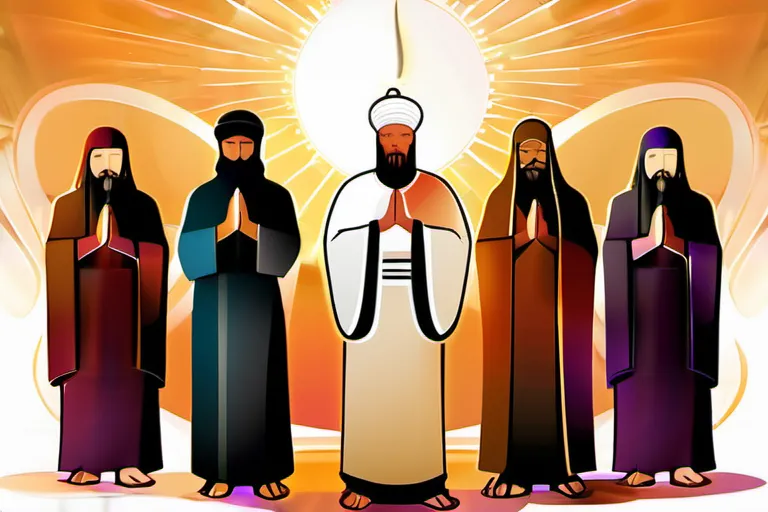Exploring the Significance and Impact of Prophets Across Major World Religions
This comprehensive article delves into the role of prophets in various religions, shedding light on their significance, functions, and contributions to religious beliefs and practices.
The Concept of Prophethood Across Religions
The concept of prophethood across religions is like a thread weaving through various tapestries, each unique yet interconnected. In Judaism, prophets are seen as messengers from God, often delivering divine warnings or calls to morality. Is it not intriguing how these figures, like Moses, guided their people with both commandments and curses? How do the Prophets of Israel, including Isaiah and Jeremiah, continue to resonate in the hearts of those seeking spiritual guidance?
In Christianity, Jesus is revered as the ultimate prophet, a title that encapsulates his role as not just a messenger but the embodiment of divine love. But what about other significant figures like John the Baptist or Moses, who also played pivotal roles? How do their teachings intertwine with Christ’s message, and how are they perceived by different Christian denominations?
In Islam, the concept of prophethood is deeply rooted in the prophets’ mission to guide humanity. Muhammad, as the final prophet, brought forth the Koran, a book that Muslims believe completes previous scriptures. How does this belief shape the understanding of other prophets like Adam, Noah, and Abraham? Do their stories hold similar or contrasting roles within Islamic doctrine?
Hinduism also recognizes prophetic figures but in a slightly different context. Prophets are often seen as divine incarnations or avatars who come to restore dharma (righteousness). Figures like Rama and Krishna exemplify these roles, their teachings embedded within the fabric of Hindu culture. How do these prophetic figures influence daily life and rituals in modern Hindu society?
Buddhism, on the other hand, sees prophets as enlightened beings who guide others to enlightenment through their own experiences and insights. The Buddha is central here but other figures like Maitreya are also anticipated. How do these prophetic figures differ from those in monotheistic religions, focusing more on individual salvation rather than a direct divine command?
These diverse perspectives on prophethood not only reflect the unique beliefs and practices of each religion but also highlight the universal quest for spiritual guidance and understanding. Each prophet’s story is a journey that invites us to explore our own paths toward wisdom and compassion.
Key Prophetic Figures in Each Religion
When we delve into the lives, teachings, and impact of key prophets across major world religions, it’s like tracing the threads of a vast tapestry woven through time. Consider Moses in Judaism—was he not a humble shepherd who became the liberator of a nation? Picture him receiving the Ten Commandments on Mount Sinai; it’s as if divine wisdom was being chiseled directly into stone, shaping the moral and legal foundations of a people.
In Christianity, Jesus stands out not just as a teacher, but as one who turned water into wine, healed the sick, and forgave sinners. How can we overlook his last supper, when he shared bread and wine as symbols of his body and blood? These actions symbolize the transformational power of faith and love, influencing countless lives and shaping Christian ethics and rituals.
Moving to Islam, Muhammad’s journey is a beacon of guidance. From being an unassuming merchant in Mecca to becoming a leader who unified Arabia under the banner of monotheism, his life story is one of profound spiritual awakening. The Quran, revealed to him over 23 years, contains teachings that have guided Muslims for centuries, addressing everything from governance and social justice to personal conduct and moral values.
In Hinduism, Krishna emerges as a multifaceted figure—part god, part human, and philosopher. His teachings in the Bhagavad Gita offer profound insights on dharma (duty) and karma (action), guiding adherents on their paths to enlightenment and self-realization. Through metaphors like the chariot of life, Krishna teaches us how to navigate our lives with wisdom and righteousness.
Buddha’s journey is a testament to personal transformation. Born into royalty but renouncing his luxurious life in search of spiritual truth, he founded Buddhism after achieving enlightenment under the Bodhi tree. His teachings on anicca (impermanence), (suffering), and anatta (non-self) challenge us to seek inner peace and liberation from suffering, offering a path of mindfulness and meditation.
Each of these prophets left an indelible mark on their respective religions, acting as conduits for divine messages that continue to influence the world. Whether it’s Moses leading Israel out of slavery, Jesus teaching compassion and forgiveness, Muhammad uniting Arabia under monotheism, Krishna sharing wisdom through dharma, or Buddha guiding seekers towards enlightenment—these figures have shaped not only their religions but also human history and culture in profound ways.
The Role of Prophets in Revelation
Imagine prophets as the navigational beacons guiding humanity through the vast and often murky seas of existence. In every major religion, these figures are seen as vessels for divine revelations, bringing light to darkness and wisdom to ignorance. How do they receive these profound insights? And what impact do these revelations have on religious texts and beliefs?
In Judaism, the Moses is revered not just as a lawgiver but as one who heard the voice of God on Mount Sinai. His encounter with the burning bush was more than a simple story; it was a pivotal moment that shaped the foundation of the Jewish faith and the Ten Commandments. How did Moses perceive this divine communication, and what does it mean for those who follow his path?
In Christianity, Jesus is often depicted as receiving revelations through miracles, parables, and direct encounters with angels or God the Father. His teachings are recorded in the New Testament, where he speaks of a kingdom not of this world. How did Jesus convey these divine insights, and how have they influenced Christian doctrine and practice?
In Islam, Muhammad is considered the final prophet, receiving revelations through the angel Gabriel over 23 years. These revelations are compiled in the Quran, which Muslims believe to be the word of God. How did Muhammad interpret these divine messages, and what impact has this had on Islamic teachings and practices?
In Hinduism, Krishna is seen as both a human and an avatar of Vishnu, often receiving revelations that guide his actions and those around him. His wisdom is encapsulated in the Bhagavad Gita, where he teaches about duty, righteousness, and ultimate truth. How did Krishna receive these divine instructions, and how do they continue to shape Hindu thought?
And in Buddhism, Buddha received enlightenment under a bodhi tree, leading him to teach the Four Noble Truths and the Eightfold Path. His revelations transformed his life and those of countless followers over centuries. How did the Buddha perceive these divine insights, and what legacy have they left behind?
These prophets, with their unique experiences of receiving divine revelations, have fundamentally shaped religious texts and beliefs across major world religions. Their stories remind us that the quest for understanding the divine is a timeless journey, one that continues to guide and inspire millions worldwide.
Prophetic Miracles: Verification and Significance
Have you ever wondered how prophets managed to convince their followers that they were chosen by a higher power? In many religious traditions, the concept of miracles attributed to prophets serves as a validation of their divine mission. But what exactly are these ‘miracles,’ and why do they hold such significance?
Miracles performed by prophets often involve supernatural feats that defy natural laws—cures from fatal diseases, raising the dead, or even predicting future events. These acts are meant to demonstrate the prophet’s connection with the divine, ensuring their followers remain steadfast in their faith.
For instance, consider the story of Elijah and the drought in the Bible. Did Elijah truly have the power to summon rain by praying, or was it a manifestation of his deep spiritual connection? The idea is that such miracles act as signs, confirming the prophet’s legitimacy.
In Islam, the Prophet Muhammad’s miracles often involved prophetic dreams and revelations. These visions were said to come directly from Allah, underscoring his role as a messenger. But how can we verify these claims? Many argue that the consistency of the messages and their impact on society provide evidence.
Similarly, in Christianity, the resurrection of Jesus is seen as a pivotal miracle. How do believers justify this event’s occurrence without empirical proof? The emphasis lies on the transformative power of such events—how they inspire faith and change lives.
These miraculous acts serve not just as validation but also as tools for evangelism, serving to spread the word about the prophet’s divine mission. They act like a beacon, drawing people towards what is seen as truth.
But how do we reconcile these seemingly impossible feats with our modern understanding of science and reason? Do they hold any significance in today’s world where faith and rationality are often seen as opposing forces?
The verification of these miracles varies greatly across different religious traditions. Some rely on oral history, while others look for written records or even physical evidence left behind by the prophets.
In summary, miracles attributed to prophets play a crucial role in establishing their credibility and shaping religious beliefs. They are more than just magical events; they are metaphors for profound spiritual experiences that shape the course of human history.
The Legacy of Prophets: Influence on Religious Practices
The teachings and actions of prophets have left an indelible mark on religious practices, rituals, and customs across different religions. How can we begin to fathom the profound impact these figures have had? Are their words merely historical echoes or do they resonate through time, guiding our spiritual journeys?
Consider the sacred texts of various faiths—each one rich with the wisdom and directives of its prophets. In Christianity, Jesus Christ is often referred to as the “Light of the World”, his teachings illuminating paths to forgiveness and love. Could we imagine Christian practices without the Bible and the commandments imparted by Jesus? The ritual of baptism, a symbolic washing away of sins, finds its roots in these prophetic messages.
In Islam, the Prophet Muhammad’s life serves as a blueprint for Muslims. His example, or Sunnah, is a guidebook for daily living, shaping everything from prayer and fasting to charitable giving. How would Islamic communities function without these clear directives? The Quran, a testament to divine guidance through the prophet, is the central text that defines Muslim beliefs and practices.
The role of prophets in Judaism also underscores their significance. Figures like Moses are not just historical figures but are revered for delivering the Ten Commandments and leading the Israelites out of Egypt. Their actions and words, captured in the Torah, continue to shape Jewish law and tradition. How would the mitzvot (commandments) be understood without these prophetic revelations?
Even in Hinduism, prophets like Krishna and Ram offer moral and spiritual guidance through their lives and teachings. Their stories are enshrined in sacred epics such as the Bhagavad Gita and the Ramayana. How do these narratives influence daily life and religious practices among Hindus? The lessons of selfless action, devotion, and righteousness that these prophets impart continue to guide believers.
The legacy of prophets extends beyond their time, influencing not only religious practices but also ethical behavior and social norms. Could we imagine our world without the principles of justice and compassion that many attribute to these figures?
In exploring the influence of prophets on religious practices, it becomes evident that their teachings are more than just historical records; they are living presences shaping spiritual and moral landscapes. The enduring impact of these prophetic voices serves as a testament to the timeless relevance of their wisdom.
The Enduring Impact of Prophets: Lessons for Today’s World
The enduring impact of prophets on contemporary society is undeniable, but do we truly understand their lasting influence? Prophets have been guiding lights in many religions, offering wisdom and moral guidance that transcends time. Can you imagine a world without the teachings of Moses, whose commandments shape societies and legal systems today?
Consider the figure of Jesus Christ, who taught compassion, forgiveness, and love—principles that continue to inspire people around the globe. How could we have developed such a rich tapestry of ethical living without his profound influence? His parables serve as timeless metaphors for understanding complex moral issues, making them relevant even in today’s rapidly changing world.
In Islam, the role of Muhammad is central to its teachings. His message of unity and social justice resonates deeply with Muslims worldwide. Through his example, people are encouraged to strive for a better society where every individual’s rights are respected. Isn’t it fascinating how one man’s journey could lead to such transformative changes?
The impact of prophets extends beyond religious boundaries as well. Their messages of peace and unity often transcend their original contexts, providing insights that can help us address modern challenges like climate change and social inequality. Think about it: if prophets were alive today, what new visions might they offer for a sustainable future?
Conclusion
 By examining the lives and teachings of key prophetic figures, we gain a deeper understanding of the spiritual guidance they provided and the enduring impact they continue to have on humanity.
By examining the lives and teachings of key prophetic figures, we gain a deeper understanding of the spiritual guidance they provided and the enduring impact they continue to have on humanity.











